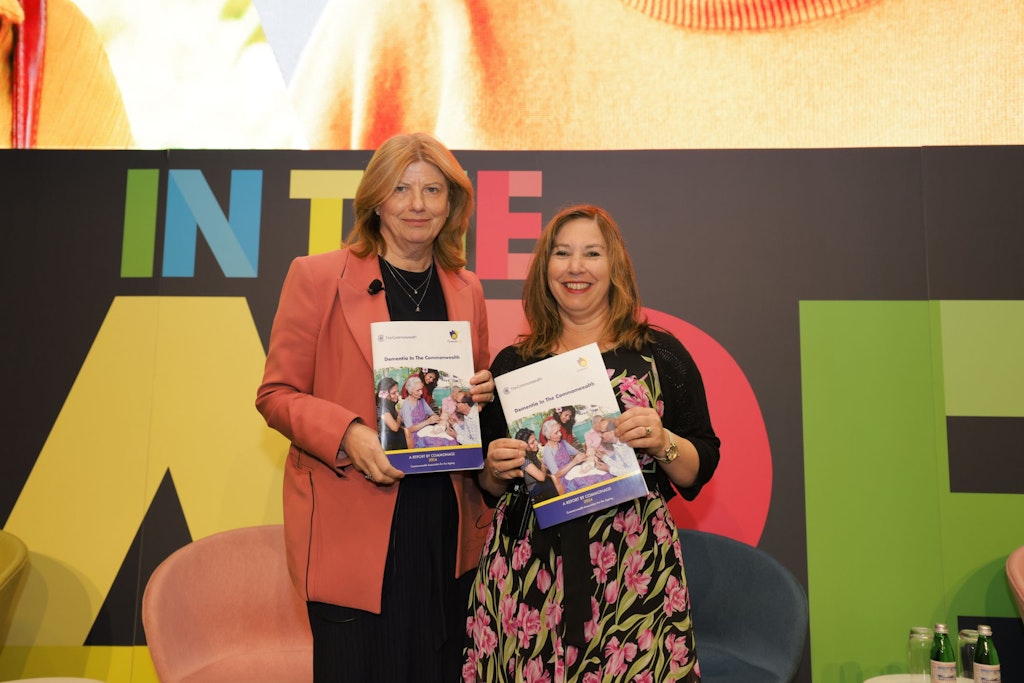CommonAge launches Dementia in the Commonwealth report
Published on 9 September 2024 (Last updated on 13 September 2024)

CommonAge, the Commonwealth Association for the Ageing, launched its Dementia in the Commonwealth report during the International Dementia Conference’s conclusion last week.
The pivotal publication features contributions from various dementia experts and leaders to highlight challenges, opportunities and best practices in dementia care. The report is believed to be the first of its kind focusing on Commonwealth countries.
It involved research and collaboration with experts, people living with dementia, healthcare providers, and carers from across the Commonwealth, while it also showcased successful models of care from across the Commonwealth that can serve as templates for improvement.
Key points
- 59% of Commonwealth nations do not have a national dementia strategy in place; 11% have one in place while the remaining 19% are in the development stage
- Shared challenges across the Commonwealth include the need to deal with the inequities in access to support, the workforce shortage and the need for a funding strategy
- The Report focuses more on non-healthcare dementia initiatives, including the need to raise awareness over creating dementia-friendly spaces plus the provision of culturally appropriate care and support
Dr Emma Hodges, Report Project Manager, chief editor and author, explained why the report, which features contributors from the United Kingdom, Australia, India, Jamaica and South Africa – to name a few – is so important.
“CommonAge is a charity that believes in inclusive ageing across the Commonwealth and its Board, which is made up of volunteers, is representative of the Commonwealth region. It is really exciting to have that combination of different views and health economies internationally looking at the common issue of dementia,” she shared with Hello Leaders.
Dr Hodges said there are many competing priorities for Commonwealth governments, but with many shared challenges, she would like to see them come together and address the growing impact of dementia.
“Alzheimer’s Disease International estimates by 2050, there will be 139 million people living with dementia, with the greatest increases in low- and middle-income countries,” Dr Hodges said.
“Despite the challenges, there are amazing examples of activities led by Civil Society and healthcare teams from across the Commonwealth highlighted in the report that demonstrate that by coming together and sharing knowledge and best practices, culturally appropriate solutions that enhance the quality of life for individuals living with dementia and their carers are possible for everyone.”
The report itself intends to inlock ideas and solutions to the challenges nations face. There are 26 articles covering a variety of topics, including childhood dementia, nutrition, spirituality, dementia policy and case studies from abroad.
Dr Hodges said the report is a powerful tool for aged care providers, dementia advocates and innovators because “No matter where people are starting from, there are ideas and examples that can be brought into action quickly and quite low cost.”
“What it also tells us is there are common challenges. Workforce is a common challenge across the whole of the Commonwealth. Our plea to governments is to get together and resolve this across nations so we’re not taking people from one place and putting them somewhere else, leaving this gap in countries across the Commonwealth. We need solutions for the workforce that works across nations.”
Australian contributors include Marie Alford and Dr Tom Morris from Dementia Support Australia, Glenn Rees AM, former CEO of Alzheimer’s Australia, and Dr Stephen Judd, former CEO of HammondCare.
By focusing on a broad range of nations, however, the report taps into community initiatives that are taking on challenges themselves. Dr Hodges was proud to see grassroots projects creating such a positive impact.
“Even though governments may not have their national dementia plans in place, 59% don’t have a plan, what we’re hearing and seeing on the ground is communities are getting organised,” she said.
“It’s communities and citizens that are getting together, making a difference and raising awareness. If providers can find out what is happening on the ground, grassroots activities in towns, villages and communities, and build around that, then we can connect everything. Providers don’t have to do it all on their own.”
CommonAge also promotes idea sharing, and Dr Hodges called on anyone working hard in the dementia space to share their ideas so they can be included on their website.
Future contributions could be included in the follow-up report that will hopefully be produced in about two years.